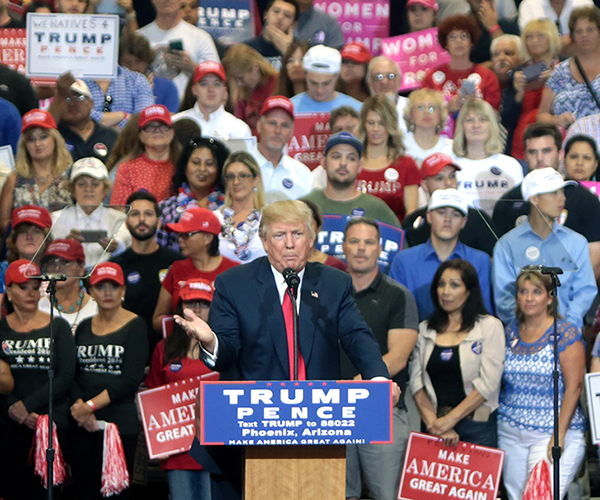Student’s reflect on media’s impact on election

Election emotions: Rallying amongst a crowd of his supporters (right), president-elect Trump speaks at a pro-Trump event in Phoenix, Arizona. Trump was elected President early in the morning of Nov. 9, 2016.
December 16, 2016
On the morning of Nov. 9, South students, some ecstatic from Donald Trump’s victory the previous night and others disheartened by the loss of their candidate of choice, stood for the routine morning announcements. As the words ‘one nation’ rung out through the intercom, the silence in the building was palpable.
According to a non-scientific Oracle-conducted survey of 270 students, approximately 80 percent expected Democratic nominee Hillary Clinton to win the presidency. This number shows the divide that existed between the perceived winner and the real winner at South. However, of the students surveyed, about 63 percent believed the media played a role in the shock following president-elect Trump’s victory.
On election night, according to senior Manny Martinez, he was working at an election booth and was not able to make it home until later that evening. He expected the map to be, for the most part, blue. However according to Martinez, when Trump had the lead, he was surprised.
“At the time I did think that everything was A-okay and that it was going to be a Clinton victory […],” Martinez said. “Everyone in the media thought that she was going to win, so it was actually quite funny on election night watching everybody stand there […] and basically have their jaws to the floor, shocked that Trump won […]. I trusted basically every source saying that she was going to win, and it turns out everybody was wrong.”
Similar to Martinez, sophomore Sophia Elouati was also taken by surprise from the results of the election. However, in contrast to the shock that Martinez attributes to the media’s flawed prediction, Elouati thought that her media outlet of choice, CNN, was reliable. According to Elouati, they never made her believe that one candidate would win over the other.
“[CNN] seemed pretty neutral to me,” Elouati said. “And even one of my teachers […] described CNN as one of the neutral news coverage places. When I was watching it with my parents, I just thought of what my teacher said about it being neutral, so I just had more trust for it.”
Radio adviser Dr. Dan Oswald explained how many perceptions during the duration of the election were based on the environment the individual was surrounded by. That being said, according to Oswald, he explained how sometimes, it is not the radio talking, but rather the voices it carries.
“[In theory], the day after the election, two students come into the room, one of whom is upset and one of whom is not upset,” Oswald said. “I’m going to remember the protests of the person who was upset because they’re making the most noise. […] It will appear to me that people are very upset when in actuality, it was a 50/50 split.”
Not only did South feel that the media played a role in post-election shock but according to 55 percent of South students surveyed, the media lacked equal and unbiased coverage. One student who felt the media was unequal was junior Tricia Katsamakis. According to Katsamakis, she felt this trend began in the very beginning when the media failed to properly cover the Democratic primary between Clinton and Bernie Sanders.
“From the beginning, when I was a Bernie Sanders supporter and there weren’t that many news sources endorsing Bernie Sanders, I had already lost some of my trust within the media,” Katsamakis said. “When I compare the political alignment of a certain news source before the election to during the election, I feel as if a lot of sources actually would side with Bernie Sanders because a lot of their opinion pieces [gave me the impression] that they were very liberal.”
Martinez, in accordance with Katsamakis, found that the media gave more air time to one candidate over the other. This inequality in coverage, according to Martinez, led to Trump’s unexpected win.
“Trump basically got free air time all the time because people wanted to see just the disaster that he was, so he was always on TV, meaning more people would hear his ideas,” Martinez said. “And over time, I guess, more people went, ‘Oh hey, I like that’ [or] ‘hey, this is different’.”
Although Elouati admits that some media outlets can be biased, she maintained trust in her media outlet of choice. Nonetheless, she encourages students to not focus solely on statistics.
“I learned that […] statistics don’t always prove a lot of things,” Elouati said. “[…] It’s just appearance versus reality; we can’t really trust what we see.”
While Oswald believes that the media can be biased, he encourages students to inform themselves on all sides of the argument. He believes it is imperative for media consumers to acknowledge that sources can be biased or influenced by money.
“Maybe not focusing on the news organizations is important and maybe better training the average person to better use the information they get to make informed decisions is the way to go,” Oswald said. “We will never change Fox, we will never change NBC, […] we’ll never change Disney. There is too much power, too much money. So rather [than] trying to change them, change the people who consume their product.”


